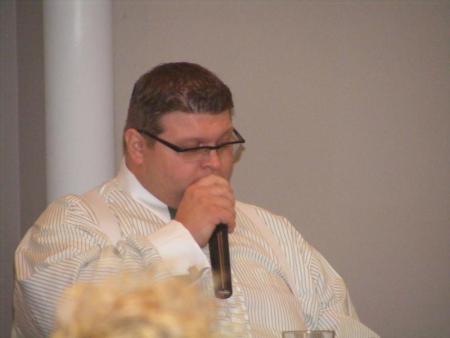 On April 13, 2006, Susan Cenkus took her six year old daughter and two year old son to one of her favorite places, a serene, sixty-five foot waterfall in Cherokee National Forest, near Chattanooga, Tennessee. What followed was an unthinkable tragedy. A black bear, apparently just emerging from hibernation, launched a brutal and unprovoked attack on her family. Susan heroically saved her son from the powerful claws of the predator, and turned to stare down the wild animal. Angered by her actions, the bear lunged at her, viciously biting into her neck, crushing bones and ripping deep lacerations in her body. She regained consciousness briefly before being life-flighted to a nearby medical center only to learn that the bear had killed her beautiful daughter, Elora. The medical team miraculously saved Susan’s life. After nineteen days in the hospital, nine of them in a drug-induced coma, and seven surgeries later, she finally went home.
On April 13, 2006, Susan Cenkus took her six year old daughter and two year old son to one of her favorite places, a serene, sixty-five foot waterfall in Cherokee National Forest, near Chattanooga, Tennessee. What followed was an unthinkable tragedy. A black bear, apparently just emerging from hibernation, launched a brutal and unprovoked attack on her family. Susan heroically saved her son from the powerful claws of the predator, and turned to stare down the wild animal. Angered by her actions, the bear lunged at her, viciously biting into her neck, crushing bones and ripping deep lacerations in her body. She regained consciousness briefly before being life-flighted to a nearby medical center only to learn that the bear had killed her beautiful daughter, Elora. The medical team miraculously saved Susan’s life. After nineteen days in the hospital, nine of them in a drug-induced coma, and seven surgeries later, she finally went home.
 Susan now travels out from her hometown in Clyde, Ohio, sharing her story. She has discovered that only the spirituality of life can lift a person out of an horrific ordeal of injury and death and heal the deep, emotional wounds. Life without spirituality reduces mankind to protoplasm, electrical impulses and aimless careenings. In a feature story about Susan, Molly Kavanaugh of the Cleveland Plain Dealer wrote, “Cenkus has played piano and sung in church since she was a young child. She believes in a gracious, loving God and had turned to him for comfort during two divorces. But nothing could prepare her for the heartache of losing her only daughter. ‘When the hard times come, you have to have a deep relationship with God,’ her father said. Paul became his daughter’s rock of support. For about four months, she and Luke lived with her parents so they could be looked after while her husband was at work. Father and daughter spent hours praying and sifting through memories, both painful and loving.” (CPD, 5-5-08).
Susan now travels out from her hometown in Clyde, Ohio, sharing her story. She has discovered that only the spirituality of life can lift a person out of an horrific ordeal of injury and death and heal the deep, emotional wounds. Life without spirituality reduces mankind to protoplasm, electrical impulses and aimless careenings. In a feature story about Susan, Molly Kavanaugh of the Cleveland Plain Dealer wrote, “Cenkus has played piano and sung in church since she was a young child. She believes in a gracious, loving God and had turned to him for comfort during two divorces. But nothing could prepare her for the heartache of losing her only daughter. ‘When the hard times come, you have to have a deep relationship with God,’ her father said. Paul became his daughter’s rock of support. For about four months, she and Luke lived with her parents so they could be looked after while her husband was at work. Father and daughter spent hours praying and sifting through memories, both painful and loving.” (CPD, 5-5-08).
Up to this point, this book has targeted all things temporal. Your personality, your social image, your personal effectiveness and your mental acumen all relate to your earthly welfare. But, even if these efforts result in a wildly successful new you, it’s all in vain if you fail to develop your spiritual nature. Paul said, “If in this life only we have hope in Christ, we are of all men most miserable.” 1 Corinthians 15:19. Most of what you hear in today’s media is for “this life only.” Scant attention is paid to our spiritual essence, leaving us shallow, hollow and disconnected. You are not primarily a body with a spirit attached. Rather, you are a spirit living in a body. This fact signals a fundamental change in your perspective on life. Your script must now take wings and soar above all else.
In his “Four Dimensions of Life,” segment of The 7 Habits of Highly Successful People, Stephen Covey makes an especially insightful observation. He says “Renewing the spiritual dimension provides leadership to your life.” This must resonate. Every other aspect of your life pulsates with power, ability and talent, but they are meaningless without leadership. Think of them as air escaping from a balloon. The brightly colored balloon races around the room in fantastic arcs, randomly slamming into walls and lamps, creating lots of noise and excitement. Unfortunately, with no specific path or purpose, it ends up in a shriveled little wad of plastic on the floor, having spent all its resources, and nothing to show for it. We’ve all known balloons disguised as people. But, if you want more to life than a colorful flight to nowhere, begin to seriously consider writing your spiritual script.
So, what are we talking about? The inner man, the soul, the spirit, the heart, the seat of your emotions, your core being, the divine breath within you, the real you, the indefinable essence of your life. We can’t define it with precision, but we know it exists. And, it calls for strategies that seem bizarre to the physical and material realm. Paul writes about this different strategy. “For though we live in the world, we do not wage war as the world does. The weapons we fight with are not the weapons of the world. On the contrary, they have divine power to demolish strongholds.” 2 Corinthians 10:3-4 (NIV). In order to do this, you must rip script handed to you by secularists.
Pray a prayer you’ve never prayed before.
The lowest kind of praying borders on the juvenile. It is selfish “gimme” praying, insisting that God cater to our wants. Such praying services our pride, our lust for pleasure, our ambitions, and our greed. The Apostle James condemns such prayers. “You ask and do not receive, because you ask amiss, that you may spend it on your pleasures.” James 4:3 (NKJV). Foxhole prayers, fear-motivated prayers and prayers in the midst of tragedy cause people to say things to God that they probably wouldn’t say when all is well, and don’t remember when out of danger.
Spirituality recognizes the carnality of “praying amiss” and searches out the mind and will of God before petitioning Him. Spiritual praying squeezes truly honest expressions from the heart to the lips. This is when and where people drop all pretenses and lay their soul bare before God. If you want to elevate your spirituality, you need to voluntarily go to that level of prayer without a selfish interest, without the threat of some horrific event, or without an attitude of desperation.
In a moment of epiphany, galvanized into action by the vision of the exalted Lord and lips seared with coals from the sacred altar, Isaiah boldly prayed, “Here am I Lord, send me.” Hannah, the barren mother of Samuel prayed, “O LORD of hosts, if You will indeed look on the affliction of Your maidservant and remember me, and not forget Your maidservant, but will give Your maidservant a male child, then I will give him to the LORD all the days of his life.” 1 Samuel 1:11 (NKJV). These were courageous prayers, but, the most radical and sacrificial prayer in the Bible was from our Lord Jesus Christ. Anticipating the excruciating pain and the enormous shame He was about to endure, Jesus still prayed, “Father, if thou be willing, remove this cup from me: nevertheless not my will, but thine, be done.” Luke 22:42 (KJV). My salvation, and yours, hang on that one word, “nevertheless!”
The common denominator in every spiritual prayer of the Bible is sacrificial giving. Isaiah gave up his personal dreams, Hannah was willing to give up her son, and Christ laid his own life on the altar. This is your template. What are you willing to give up? How deep will you go into the inner recesses of your soul? What guarded treasure, what carnal goal, what cherished dream will you relinquish in submission to the will of God? Did your old script hold you back from the edge? Did you always renege when things got too hot? Your new script should take you to the brink, and then beyond. It is your ticket to spiritual freedom.
Make a commitment you’ve never made before.
Legend has it that Julius Caesar had a commitment problem with his soldiers when they launched their invasion of England. He assembled the troops near the white cliffs of Dover and told them to look out at the harbor. Their eyes were greeted with the fiery wreckage of every ship used to arrive in Britain from Gaul. With all hopes of retreat gone, the Roman armies were forcibly committed to conquering the land. That’s exactly what they did. The commitment was Caesar’s and not the soldiers, but the troops learned commitment anyway.
“Commitmentphobia,” a term coined by Steven A. Carter and Julia Sokol, is rooted in the irrational fear of making a wrong decision and of canceling out all options. A trapped or caged animal best illustrates the feelings of those who fear commitment. It’s not that phobics take commitment lightly; it’s actually the opposite. They take commitment so seriously that they equate it with death. The sad fact is, however, that avoidance of commitment leads to a forfeiture of life. While those who run from commitment keep their personal freedom intact, their life ends up devoid of a certain richness and verve that commitment to a single cause, person or idea brings. Nearly every significant development or invention in life can be attributed to commitment. Someone had to say, “For this, I am willing to give my life!” I would rather live until I die, than die while I live! Dr. Martin Luther King, Jr. models this commitment in a classic way:
“So King went back to Memphis to start another march. On April 3, he made a speech there. Toward the end, he talked about death. He had been warned he would be killed in Memphis, he said.
“But death doesn’t matter with me now,” he said. “Because I’ve been to the mountaintop. And I’ve looked over, and I’ve seen the promised land. I may not get there with you. But I want you to know that we as a people will get to the promised land. So I’m happy. I’m not fearing any man. Mine eyes have seen the glory of the coming of the Lord.”
It was King’s last speech. The next day, King met with his helpers in his room. It was on the second floor of a motel. King told his friends that nonviolence was the only hope of saving the soul of this nation.
Later, King went out on the balcony outside his room. He wanted to relax before dinner. Suddenly, there was the sound of a rifle shot. It came from a rooming house across the way. The bullet ripped into King’s face and slammed him against the wall. Then he fell to the floor. Less than an hour later, he died in a hospital.” (Scholastic Scope).
Why commit? Because, afterwards, you are guaranteed to be assailed by feelings of regret, daunting adversity and doubts that you will succeed. Had you not committed yourself, the temptation to turn and run away would be overwhelming. Thus, commitment necessarily escorts you into a different realm of life with an entirely different set of challenges. You will be amazed at the person you will become. Commitment calls patience out of hiding; it forces the nascent quality of perseverance into maturity; it demands that endurance man up and show itself; it summons to front and center all your powers of creativity and innovation; it elevates character to the prominent place of life leadership.
What commitments have you always resisted? A more regimented discipleship program? More time with your spouse and family? Intensifying your devotional life? Enhancing your education? It could be something uncomplicated. Or, it could be some esoteric item that only involves you. What difference will it make in the world? More to the point, what difference will it make in you? Commitment to a noble cause brings exponential growth to your spirit.
Sacrifice a part of yourself you’ve never given up before.
The Bible mandates sacrifice. The scarlet thread of sacrifice wends its way throughout the Bible, from Adam to Calvary, and from Calvary to the Apocalypse. The worth of a sacrifice is directly proportional to its cost to the supplicant. King David turned down the opportunity to offer a sacrifice provided by someone else at no cost to him. He said “Neither will I offer to God that which costs me nothing.” Not only was he obedient to the mandate, he understood the mandate. King Solomon placed the highest possible value on the temple he built for the Lord by dedicating it with elaborate sacrifices commensurate with the value of the temple.
“Then the king and all the people offered sacrifices before the LORD. King Solomon offered a sacrifice of twenty-two thousand bulls and one hundred and twenty thousand sheep. So the king and all the people dedicated the house of God. 2 Chronicles 7:4-5 (NKJV)
In Christ’s parable, the nameless man who shall forever be known only as “The Good Samaritan” chose to sacrifice his time and money, in contrast to other religious types who passed by on the other side of the road. This scenario was not lost on Dr. Martin Luther King, Jr. He said, “The first question which the priest and the Levite asked was: ‘If I stop to help this man, what will happen to me?’ But the Good Samaritan reversed the question: ‘If I do not stop to help this man, what will happen to him?” True sacrifice is driven by an unselfish concern for others, not a calculated scheme for one’s own benefit.
Break out the searchlight of introspection and dig around your life’s inventory. Tear down the fences and “no trespassing” signs that have long guarded certain areas of your heart. Selfish or greedy clinging to your stuff is akin to the spoiled child who screams when someone else touches one of his toys. Maybe it’s your money. It could be your time. Many people refuse to release their grip on pleasures, personal welfare, talents, abilities, skills, information, certain possessions, privileges, access to owned commodities like tools, instruments, houses or lands. It could even be your ego, your intellect, your reputation, your position, your public image or your status that you are protecting. It is time to realize that it’s not what you own that makes you significant; it is who you really are in the depths of your soul. In fact, liberating yourself from all things carnal will actually affect your selfish nature 180° opposite of what you fear. You will feel freer, not more restricted; richer, not poorer; bigger, not smaller; more connected, not isolated; closer to, not farther from, God.
More specifically, the very thing you refuse to sacrifice embodies your most sensitive trait. You have consciously avoided the invasive probing of God’s voice when He speaks to you about this matter. The reason is clear. This area, more than any other, is the peg on which you hang your pride. You embrace it as the real you. If you lose this, you think all is lost. Jesus pinpointed this in another parable.
“Now a man came up to Jesus and asked, “Teacher, what good thing must I do to get eternal life?”
“Why do you ask me about what is good?” Jesus replied. “There is only One who is good. If you want to enter life, obey the commandments.”
“Which ones?” the man inquired.
Jesus replied, “‘Do not murder, do not commit adultery, do not steal, do not give false testimony, honor your father and mother,’ and ‘love your neighbor as yourself.’”
“All these I have kept,” the young man said. “What do I still lack?”
Jesus answered, “If you want to be perfect, go, sell your possessions and give to the poor, and you will have treasure in heaven. Then come, follow me.”
When the young man heard this, he went away sad, because he had great wealth.
Then Jesus said to his disciples, “I tell you the truth, it is hard for a rich man to enter the kingdom of heaven. Again I tell you, it is easier for a camel to go through the eye of a needle than for a rich man to enter the kingdom of God.” Matthew 19:16-24 (NIV)
Each sacrifice you make is another step up on the climb to greater spirituality. Don’t get the wrong idea, though. You can’t sacrifice your way into spirituality in an attempt to impress God. Rather, through sacrifice, you impose God’s values on your personal value system. It is bringing your thoughts into alignment with God’s. It is shaking up the disorganization of your life to reflect the hierarchy of heaven. It is reaching into the depths of your soul, and finding a cancerous tumor, pulling it out, roots and all. The writer to the Hebrews said, “Therefore, since we are surrounded by such a great cloud of witnesses, let us throw off everything that hinders and the sin that so easily entangles, and let us run with perseverance the race marked out for us.” Hebrews 12:1 (NIV). The precious commodity you sacrifice may be the precise roadblock which hinders you on your spiritual journey.
Embrace God in a spiritual sense you’ve never had the courage to do before.
My father-in-law, Fred Kinzie, lay in a Pensacola, Florida hospital for fifteen days straight, paralyzed with scarlet fever. He lived on morphine. The year was 1943. He and his wife, Vera, were taking a break from the farm he owned near the little village of LaPaz, in northwest Indiana. They were not vacationing. They were helping in an evangelistic crusade, providing music, prayer and anything else asked of them. He had strongly felt for some time that he should sell the farm and launch out into ministry on his own. It looked like a huge step, however, and there were serious doubts as to the long-term success of the venture. Now, it looked like his life was coming to an end. In that critical moment, he surrendered. He summoned Vera to his side and told her to write a letter back home, instructing his father to put up the farm for sale. Immediately, he fell into a deep sleep. Sometime during that night, his fever broke. When he awoke the next morning, he was pain free! He left the hospital that day, followed through with his decision, and “The Kinzie Evangelistic Party” became one of the most popular groups on the circuit for the next ten years. In his subsequent ministry, he never failed to tell the story of his miraculous healing, always basing it on his decision to embrace the calling of God on his life.
For Fred Kinzie, the challenge was full time ministry. Relatively speaking, that calling only applies to a fraction of Jesus followers. Most wrestle with a very different set of circumstances, yet the essence of the struggle is the same. Paul said, “I press toward the mark for the prize of the high calling of God in Christ Jesus.” (Philippians 3:14). His expression is representative of an innate desire for spiritual upward mobility common to all sincere Christians. Unless we pursue that desire, we stagnate, languishing in boring, fetid monotony, never realizing half of what we were destined to be. Of the many frustrations I have experienced in over four decades of full-time ministry, none is worse than seeing someone with giant-sized potential settle for a pint-sized vision. By the same token, nothing is more gratifying than watching someone with limited abilities refuse to stop until he or she achieved an incredible level of success.
What do you need courage to embrace today? You’ve flown high on the wings of your wildest dreams; you’ve taken hostile territory, conquered formidable foes, banqueted with angels and touched the face of God. You were destined for greatness. Then, somebody who had you saddled with much lower expectations, somebody who never envisioned you at anything higher than pedestrian level accomplishments, handed you a plain vanilla, muted script. Days, months, years have passed. Your dreams float back into your mind, sometimes they assail you, but you have learned how to suppress them and get your mind focused back on “reality.” Yet, you somehow feel cheated and unfulfilled. You are like an airplane. It fits nicely into a hangar, but it was built for the air. You’ve managed your suppressed life okay, but you were built for much more. Embrace God. He’ll take you where you were meant to be.
 My final story is about a friend of mine, Bobby Wade. (Bobby gave me permission to share his story.) An anointed and insightful evangelist, Bobby was nevertheless hopelessly limited. His weight had gotten out of control to the point that he tipped the scales at over 600 pounds! He was forced to sit on a stool behind the pulpit just to preach. One by one, pastors cancelled his visits until there were few places that would have him come. His ministry had reached a crisis point. About the same time, he developed some other weight-related physical conditions that were causing lack of sleep, major skin irritations, and other problems.
My final story is about a friend of mine, Bobby Wade. (Bobby gave me permission to share his story.) An anointed and insightful evangelist, Bobby was nevertheless hopelessly limited. His weight had gotten out of control to the point that he tipped the scales at over 600 pounds! He was forced to sit on a stool behind the pulpit just to preach. One by one, pastors cancelled his visits until there were few places that would have him come. His ministry had reached a crisis point. About the same time, he developed some other weight-related physical conditions that were causing lack of sleep, major skin irritations, and other problems.
Sometime in 2008, he heard the voice of God speaking to him. In so many words, the Lord said, “Bobby, it is time to do something about your weight. You will die an early death if you fail to act now.” Even more, God revealed to Bobby that his physical weight was interfering with his spiritual growth. There were places in the realms of the Spirit that God could take him if only he were to apply major discipline to his physical condition.
By this time, Bobby had heard all about the options that were open to him. He knew about pills he could take. He knew about stomach bypass surgery. He knew about special, radical diets and other extreme measures he could take. He felt that none of them was for him. If God had spoken to him about his weight, then God was well able to direct his strategy to lose the weight. That’s exactly what happened. Through self-discipline, voluntarily restricting his own intake, carefully regulating the kinds of food he would eat, Bobby began to shed pounds. First, fifty, then one hundred, then two hundred, then three hundred pounds melted away! When he came to our church for the first time, he was under three hundred pounds, not necessarily svelte, but a far cry from his former weight! Not only has his ministry expanded to many other churches, he now has an inspirational story to tell about the power of God that helped him lose so much weight. His travels have now even taken him to mission trips overseas. Bobby is a hero of mine, an awesome testimony to the desire to embrace God in a powerful, new way.
It’s time to reject the script handed to you by someone else. Your personal relationship with God is at stake. You must write your spiritual renewing script. Pray a prayer you’ve never prayed before. Make a commitment you’ve never made before. Sacrifice a part of yourself you’ve never given up before. Embrace God in a spiritual sense you’ve never had the courage to do before. All of these steps, individually and collectively will transport you into a spiritual realm that you could never experience otherwise.
The world will hear from you.
 Monday, April 29, 2013 at 09:23AM
Monday, April 29, 2013 at 09:23AM 









